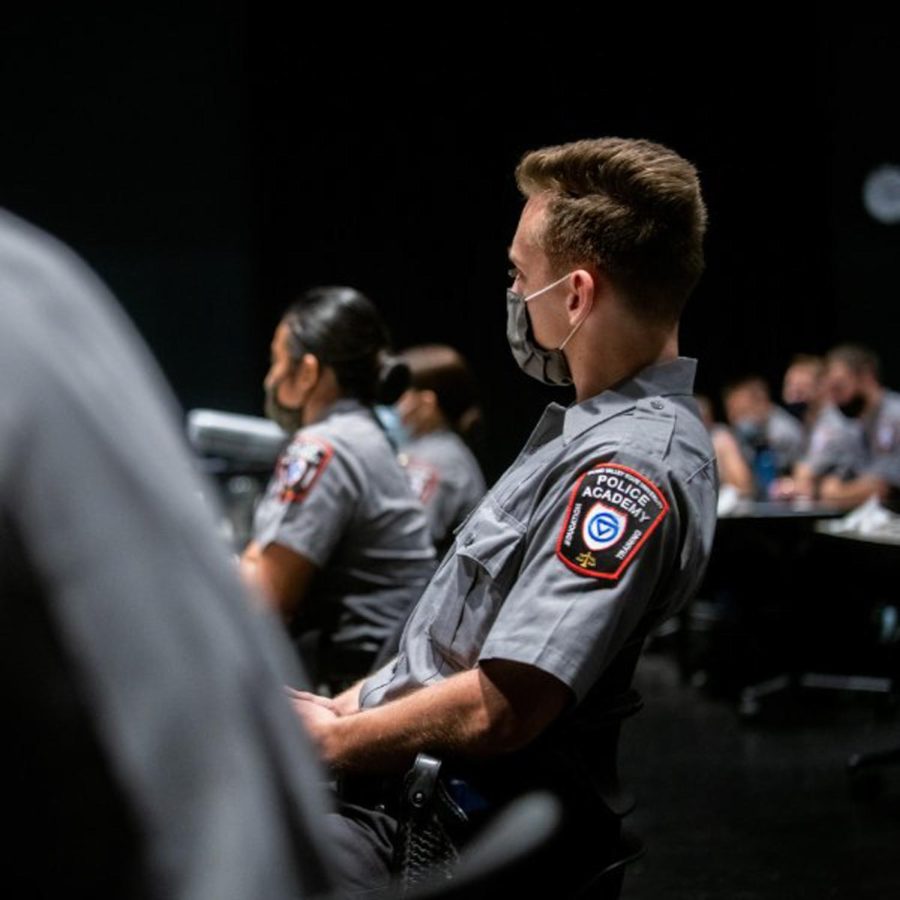GV Police Academy prepares 50th graduating class amidst shifting field
Sep 12, 2022
Many things have changed since 1974 when Grand Valley State University’s first class of future law enforcement officers entered its doors.
Although GVSU’s Police Academy has seen more than a thousand cadets pass through its program and into the arena of professional law enforcement, training methods over time have become vastly different as the academy prepares to produce its 50th graduating class this year.
Through the development of technology, social change and an overall shift in public opinion on training for law enforcement, the academy has seen an expansive range of changes since the first group of recruits.
Williamson Wallace, Director of Criminal Justice Training, said that GVSU’s Police Academy has worked to develop an additional curriculum for their cadets in conjunction with the educational requirements from Michigan Commission on Law Enforcement Standards. As modern issues have warranted modern solutions for the law enforcement arena, the academy has largely shifted the ideologies behind the educational program.
“In the past, police academies have been run kind of like a military boot camp,” Wallace said. “In 2015, we began to move away from that bootcamp model and more towards a professional collegiate model, which moves away from the warrior mindset into the guardian mindset.”
Traditional law enforcement programs require roughly 600 hours of training, typically completed over a 15-week period. GVSU’s Police Academy has added an additional 90 hours of curriculum in relevant areas to further address issues of concern and possible contention within the community.
Wallace said that the additional training expands cadets’ knowledge in areas such as LGBTQ law enforcement, implicit bias, decision making, mental health and well-being, behavioral health crisis training, restorative practices and mediation, interpersonal communication and de-escalation techniques.
Through the addition of these courses, cadets spend more time learning how to manage a variety of issues from assisting an individual in a mental health crisis to de-escalating unsafe situations, managing their own mental health and preventing burnout and trauma.
“They’re encouraged to question and ask for evidence or proof,” Wallace said. “It’s a welcoming environment and a relaxed environment where they feel they can learn here, ask questions and really absorb the material without feeling like they’re going to be yelled at.”
As they are mentored by various field officers in their courses as a cadet, Wallace said that students leave the Police Academy with a variety of tools in their arsenal to use in place of traditional, physical force methods.
“We made it more of an adult-based learning environment, where they can work on problem-solving skills instead of just following orders,” Wallace said. “We want more graduates to be decision makers; we want them to be free thinkers.”
The Police Academy has also taken steps to ensure that they are filling their seats each semester with whom they identify as the best future law enforcement officers possible. Each candidate must undergo a series of interviews, wellness checks, background checks and academic testing to ensure their fitness for the job.
Wallace shared that academy officials even go as far as to seek out character references from roommates, employers, professors or other known associates.
It is through these implementations that GVSU’s Police Academy displays a 99% licensing exam pass average, as well as a 97% program completion rate and a 95.4% employment rate.
For more information about GVSU’s police academy, visit https://www.gvsu.edu/academy/.






















